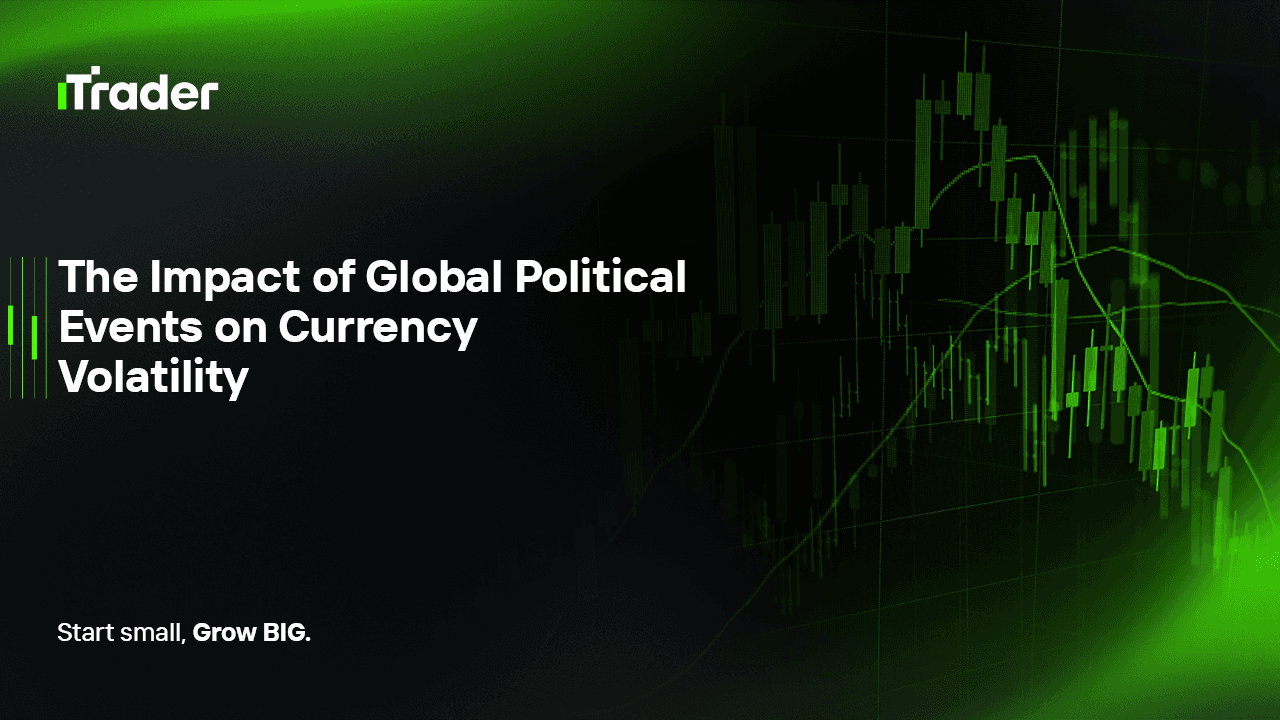2025-07-04
success depends not only on technical setups and statistical edges but also on navigating the unpredictable terrain of global political events. Geopolitical turmoil, policy changes, and election cycles often catalyze sharp movements in currency pairs, shifting sentiment faster than any economic report can. While volatility creates opportunity, it also amplifies risk — making it imperative for proprietary traders to understand and prepare for the political forces that drive the markets.

This blog explores how political events shape currency volatility and how forex prop traders can strategically position themselves before, during, and after such events.
AI Summary:
How do global political events influence forex markets? Political instability, elections, wars, sanctions, and policy shifts significantly affect currency volatility. Prop traders must learn to anticipate and hedge against these events using scenario analysis, volatility-based sizing, and adaptive risk management to stay ahead in dynamic markets.
Unlike equities or commodities, currencies are relative instruments — they reflect the comparative strength of two economies. When politics threatens the perceived stability or growth of one country, its currency reacts immediately.
Key mechanisms include:
Sudden shifts in power or uncertain outcomes (e.g., contested elections) cause dramatic repricing of risk. Market participants re-evaluate fiscal and monetary policy projections based on new leadership.
Armed conflict, especially involving major economies or key commodity-producing regions, drives risk-off flows and commodity currency weakness.
When nations impose sanctions or cut diplomatic ties, financial systems are disrupted. FX markets quickly respond to anticipated economic fallout.
Unexpected referendums (like Brexit) or sweeping policy proposals (currency pegs, capital controls) create large gaps and erratic movements.
The reaction is rarely linear — often it unfolds in phases:
Prop traders thrive on movement. Events like political surprises can provide strong directional moves or mean-reversion setups if reactions are overblown.
Unexpected gaps and slippage become more common. Strategies dependent on tight spreads, like scalping, may become unviable during these periods.
Some pairs may become untradable during crisis moments, with brokers widening spreads or suspending execution.
Avoid static lot sizes. Use ATR or implied volatility-adjusted risk models to scale down during uncertainty or widen stops.
Create event trees outlining possible outcomes and their probable market reactions. Pre-event straddles (long vol positions) may benefit from surprise outcomes.
Understand correlations — during crisis, USD, JPY, and CHF often strengthen. Commodity-linked currencies (AUD, NZD, CAD) may suffer.
Don't chase gaps or enter without volatility-adjusted risk. Let price action confirm sentiment shifts before committing.
In 2018, political tensions between the U.S. and Turkey — compounded by domestic economic mismanagement — triggered a dramatic collapse of the Turkish lira (TRY).
Lesson: Political risk is real and can become terminal without disciplined sizing and risk caps.
Forex prop traders should integrate the following tools into their playbook:
Not all political events impact the market equally. For effective trade management, prop traders should classify political risks into three levels:
Tier 1 includes scheduled events like elections or central bank speeches. These are known in advance, allowing traders to plan scenarios, adjust size, or trade volatility breakouts.
Tier 2 covers unexpected geopolitical shocks — such as wars or terrorist attacks — that cause sudden volatility spikes. In such cases, reducing exposure and waiting for stabilization is key.
Tier 3 involves long-term structural shifts like sanctions or coups. These require reassessing correlations and macro trends, as they can reshape currency behavior over months or years.
This tiered approach helps traders respond with strategy, not emotion — turning uncertainty into opportunity while protecting capital.
For prop traders, ignoring political risk is a recipe for exposure. But harnessing it — with discipline, strategic foresight, and adaptability — can offer rare windows of asymmetric opportunity. The key lies not in predicting the political event itself, but in anticipating market behavior in response to it. By doing so, traders not only protect capital but also capitalize on volatility that others fear.
In forex, politics is not just background noise — it is a primary driver of price.
2025 Ай Трейдер Глобал ХХК | Компанийн бүртгэлийн дугаар: 15962
Ай Трейдер Глобал ХХК нь Комор улсын Анжуан арал дахь Мутсамуду хотын Хамчакод байрлалтай. Тус компани нь Коморын Үнэт Цаасны Хорооноос (Securities Commission of the Comoros) олгосон L15962/ITGL дугаартай тусгай зөвшөөрлийн хүрээнд үйл ажиллагаа явуулдаг.
Ай Трейдер Глобал ХХК нь “iTrader” нэрийн дор үйл ажиллагаа явуулдаг бөгөөд (Форекс) арилжааны үйл ажиллагаа явуулах эрхтэй. Компанийн лого, барааны тэмдэг, вэбсайт нь зөвхөн Ай Трейдер Глобал ХХК компанийн өмч юм.
Ай Трейдер Глобал ХХК -ийн охин компани болох : iTrader Global Pty Ltd, Австралийн компанийн бүртгэлийн дугаар (ACN): 686 857 198. Энэ компани нь Opheleo Holdings Pty Ltd компанийн албан ёсны төлөөлөгч бөгөөд Австралийн санхүүгийн үйлчилгээний төлөөлөгчийн дугаар: 001315037 -тай. Австралийн санхүүгийн үйлчилгээний лицензийн дугаар: 000224485 -тай Level 1, 256 Rundle St, Adelaide, SA 5000 хаягт байршдаг. Анхааруулга: Энэ байгууллага нь энэхүү вэбсайт дээр болон дамжуулан арилжаалагдаж буй санхүүгийн (арилжааны) хэрэгсэл нийлүүлэгч биш бөгөөд ямар нэгэн хариуцлага хүлээхгүй болно.
Эрсдэлийн сэрэмжлүүлэг: CFD арилжааны хөшүүргийн улмаас хөрөнгөө хурдан алдах өндөр эрсдэлтэй тул бүх хэрэглэгчдэд тохиромжгүй байдаг.
Фанд, CFD болон бусад өндөр xөшүүрэгтэй арилжаа нь хэрэглэгчээс нарийн төвөгтэй ойлголтуудын талаар тусгай мэдлэг шаарддаг. Хөшүүрэгтэй арилжаанд оролцогчдын 84.01% нь алдагдал хүлээдгийг судалгаанууд харуулдаг тул хөшүүрэгтэй арилжаанд орохоос өмнө хөрөнгөө алдах маш өндөр эрсдэлтэй болохыг анхаарна уу.
iTrader нь аливаа иргэн, хуулийн этгээдийн өмнө xөшүүрэгтэй арилжааны эрсдэл, алдагдал, бусад хохирлыг бүхэлд нь хариуцахгүй болохыг мэдэгдэж байна.
Энэхүү веб сайтын мэдээ, мэдээлэл нь зөвхөн мэдлэг түгээх зорилготой тул хэрэглэгч та бие даан шийдвэр гаргана уу.
Хязгаарлалт: iTrader нь вэбсайт болон үйлчилгээгээ тухайн орны хууль тогтоомж, дүрэм журмаар хориглосон орнуудад оршин суугчдад чиглүүлдэггүй. Хэрэв та энэхүү вэбсайтыг ашиглахыг хориглосон оронд байгаа бол вэбсайт болон үйлчилгээг ашиглахдаа тухайн орны хууль тогтоомжид нийцэж байгаа эсэхийг шалгах үүрэгтэй. iTrader нь вэбсайтынхаа мэдээлэл бүх оронд тохиромжтой эсэхийг баталгаажуулдаггүй.
Ай Трейдер Глобал ХХК нь зарим улс орны иргэдэд үйлчилгээ үзүүлэхээс татгалздаг болно. Жишээлбэл: АНУ, Орос, Бразил, Канада, Израйл, Иран.